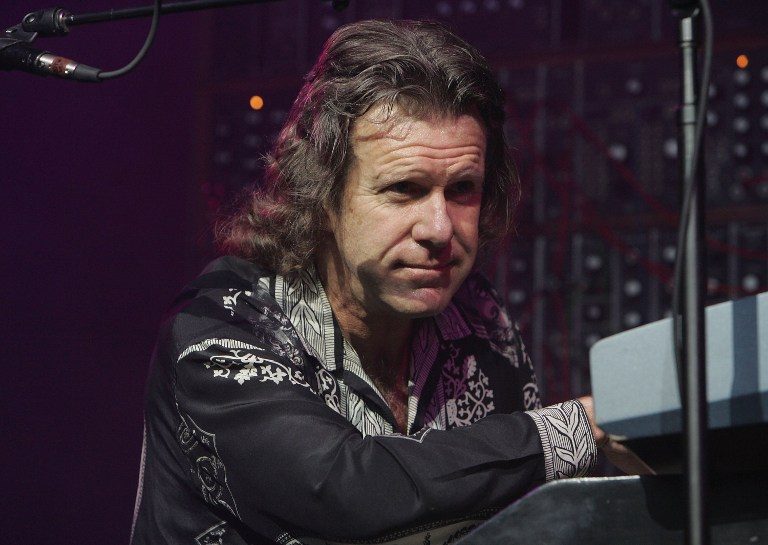SUMMARY
This is AI generated summarization, which may have errors. For context, always refer to the full article.

NEW YORK, USA – Keith Emerson, the flamboyant yet accomplished keyboardist who pioneered the use of synthesizers in rock music, was found dead Friday, March 11, in an apparent suicide. He was 71.
The English virtuoso, who became famous for his dazzling stage feats with band Emerson, Lake and Palmer, died from a bullet wound to his head at his condominium in the Los Angeles area, police said.
His longtime girlfriend, Mari Kawaguchi, called police at 1:30 am (0930 GMT).
“It is being investigated as a suicide,” said Sergeant Erika Aklufi, a police spokeswoman in oceanside Santa Monica.
Former bandmate Carl Palmer mourned Emerson as “a pioneer and an innovator whose musical genius touched all of us in the worlds of rock, classical and jazz.”
“Keith was a gentle soul whose love for music and passion for his performance as a keyboard player will remain unmatched for many years to come,” Palmer said in a statement.
Inspired by Jimi Hendrix’s theatrics with the electric guitar, Emerson created a new showmanship with the keyboards as he would attack the keys with knives and play the organ upside down with the giant instrument suspended over him.
He reached the height of his mainstream fame in 1974 when Emerson, Lake and Palmer closed California Jam, considered the last in a generation of great rock festivals which drew some 250,000 people to a speedway and was broadcast on ABC television.
Emerson, with his always flowing hair, ended the festival by strapping himself to a grand piano and playing as it spun around some 50 feet (15 meters) in the air.
Asked later about his attention-grabbing performances, Emerson told the British publication Counterculture: “Guitar players were the most mobile musicians on the stage and it’s very difficult to make a 350-pound (160-kilogram) Hammond part of you.”
“That part of the act was something that just felt natural to do; something that allowed me be more expressive,” he said.
Elaborate music concepts
Emerson studied classical piano as a child in England and eventually took up the Hammond organ as he became intrigued by jazz.
But Emerson’s career – and, to an extent, the trajectory of rock – changed when he heard the influential 1968 album “Switched-On Bach” by Wendy Carlos, who performed classical pieces on the Moog synthesizer.
The early-generation analog synthesizers – whose creator, US engineer Robert Moog, would become a friend – had gradually been finding their way into popular music, most notably appearing on The Beatles’ 1969 album “Abbey Road.”
But Emerson was considered the first to make the synthesizer a central rock instrument on its own, taking it on tour.
After his band The Nice disbanded in 1970, the keyboardist joined percussionist Palmer and singer and guitarist Greg Lake to form Emerson, Lake and Palmer, which became a force in 1970s progressive rock, a genre that emphasized advanced musical structure.
The trio won a wide following around the world but especially in Japan and Britain. Several albums including “Tarkus,” “Trilogy” and “Brain Salad Surgery” entered the top 5 on the British chart.
“Tarkus,” released in 1971, was especially innovative with the first track running more than 20 minutes long and inspired by the fictional Tarkus character – which would appear on stage – that was half tank, half armadillo.
The band also brought an experimental take to classical music, releasing a live album of Mussorgsky’s “Pictures at an Exhibition.”
Tour planned next month
Emerson had shown no public signs of distress and had scheduled a solo tour of Japan next month.
An avid Facebook user, he had written heartfelt tributes after the recent deaths of music legends David Bowie and Motorhead’s Lemmy.
But he was forced to call off a tour in 2010 to treat abnormal growth in his colon.
His last concert took place in July at the Barbican in London where he performed a tribute to Moog on a synthesizer alongside the BBC Concert Orchestra.
The concert summed up the dichotomies of Emerson’s career. An accomplished keyboardist in the classical mold, the normally courtly Emerson said he was offended that several orchestra members openly put in earplugs and two left the stage.
“Just imagine that you are talking to me across a table and I have my fingers in my ears,” he said.
Calling the minority of orchestra members unprofessional, he quipped: “Rock musicians don’t behave like this.” – Rappler.com
Add a comment
How does this make you feel?
There are no comments yet. Add your comment to start the conversation.